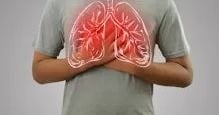World Lung Day 2025: Leading Pulmonologists Share Expert Tips for Strong and Healthy Lungs
World Lung Day 2025 highlights the importance of lung health as respiratory illnesses continue to impact millions globally. Top pulmonologists share practical tips and lifestyle advice to keep your lungs functioning optimally, from mindful breathing and exercise to reducing exposure to pollutants. This guide is designed to be accessible for everyone, offering simple strategies to improve lung health and prevent respiratory diseases.


By: Bharat Daily Samachar Date: 25 Sep,2025
Breathing Life Into Lung Health: World Lung Day 2025
Every year, World Lung Day, observed on September 25, draws attention to the vital role our lungs play in overall health. Lungs are essential for oxygenating the body, removing carbon dioxide, and supporting energy production for all bodily functions. Yet, air pollution, smoking, sedentary lifestyles, and respiratory infections continue to challenge lung health globally.
In 2025, pulmonologists are emphasizing that lung care is not just for those with respiratory issues—it’s for everyone. Early prevention, awareness, and lifestyle adjustments can dramatically improve long-term lung function.
Why Lung Health Matters
Healthy lungs enable the body to absorb oxygen efficiently, maintain energy levels, and fight off infections. Poor lung health, on the other hand, can lead to chronic conditions such as:
Asthma – causing wheezing, breathlessness, and inflammation of the airways
Chronic Obstructive Pulmonary Disease (COPD) – commonly caused by smoking and long-term exposure to pollutants
Respiratory infections – including influenza, pneumonia, and the common cold
Lung cancer – often linked to smoking and environmental toxins
Pulmonologists stress that prevention is always better than treatment. Even small lifestyle changes can reduce risks and improve overall lung capacity.
Expert Tips to Maintain Healthy Lungs
1. Quit Smoking and Avoid Secondhand Smoke
Smoking remains the leading cause of lung diseases worldwide. Pulmonologists unanimously advise quitting smoking at any age. Secondhand smoke exposure is also harmful, so maintaining a smoke-free environment is crucial.
2. Practice Deep Breathing Exercises
Regular deep breathing exercises can strengthen lung muscles, improve oxygen intake, and reduce stress. Techniques such as diaphragmatic breathing and pursed-lip breathing are simple and effective. Experts recommend spending 5–10 minutes daily practicing these exercises.
3. Stay Physically Active
Exercise increases lung capacity and efficiency. Activities like walking, jogging, swimming, and yoga help improve respiratory function. Pulmonologists advise at least 150 minutes of moderate-intensity exercise per week to keep the lungs and heart healthy.
4. Minimize Exposure to Air Pollutants
Air pollution and indoor toxins like dust, smoke, and chemicals can damage lungs over time. Experts suggest:
Using air purifiers indoors
Wearing masks in high-pollution areas
Avoiding outdoor exercise during peak pollution hours
Maintaining good ventilation in homes
5. Maintain a Healthy Diet
Certain foods are believed to support lung function. Nutritionists working with pulmonologists recommend:
Fruits and vegetables rich in antioxidants to fight inflammation
Omega-3 fatty acids for reducing respiratory inflammation
Foods high in vitamin D to strengthen immunity against infections
6. Stay Hydrated
Water keeps the mucosal linings in the lungs thin, which helps the lungs function better and facilitates easier breathing. Pulmonologists suggest drinking 6–8 glasses of water daily, depending on individual health conditions.
7. Get Regular Health Check-ups
Even if you feel healthy, annual lung health check-ups can detect early signs of respiratory issues. Pulmonologists recommend spirometry tests, chest X-rays, and lung function tests, especially for individuals exposed to high pollution or with a history of smoking.
8. Avoid Respiratory Infections
Hand hygiene, avoiding crowded places during flu season, and getting annual flu and pneumonia vaccinations can prevent respiratory infections that may compromise lung health.
Special Considerations in 2025
The ongoing concerns around air quality in urban areas and post-pandemic lung health are major focuses this year. Pulmonologists are particularly urging people to monitor post-COVID respiratory symptoms, as even mild infections can leave lingering effects on lung function.
Children and the elderly are especially vulnerable, so preventive care, vaccination, and reducing exposure to pollutants are essential.
Lung Health and Mental Well-being
Pulmonologists also highlight the connection between mental health and lung function. Stress and anxiety can worsen breathing patterns. Techniques such as meditation, mindfulness, and controlled breathing not only reduce stress but also enhance lung efficiency.
Call to Action: Protect Your Lungs
World Lung Day 2025 serves as a reminder that lungs are irreplaceable organs that deserve consistent care. Small, everyday steps—quitting smoking, staying active, practicing breathing exercises, and reducing exposure to pollutants—can collectively strengthen respiratory health.
By adopting these strategies, individuals can reduce the risk of chronic lung diseases, improve quality of life, and increase overall energy and vitality. Pulmonologists stress that it’s never too late to start caring for your lungs, and early intervention can make a lifetime of difference.
